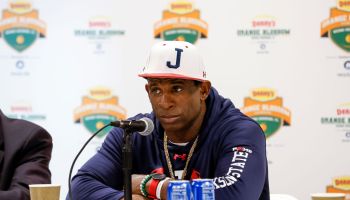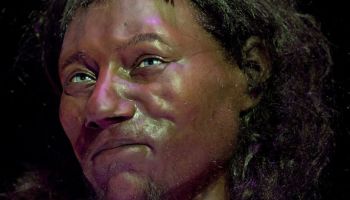In a recent interview, renowned Thriller producer Quincy Jones told Details Magazine that although he called Michael Jackson a close friend, he didn’t believe Jackson had a disease that causes depigmitation of the skin. Instead, he insinuated that Jackson – who went from a chocolate brown child to a White-complexioned adult – had deep self-hatred issues.
”We talked about it all the time,” Jones said in the interview when asked if he believed that Jackson had vitiligo, a disease that causes the loss of melanin. ”But he’d come up with, ‘Man, I promise you I have this disease,’ and so forth. I don’t believe in any of that [expletive]…It’s ridiculous, man! Chemical peels and all of it. And I don’t understand it. But he obviously didn’t want to be Black… What do you think? You see his kids?”
The producer of three of Jackson’s most revered albums isn’t alone in his conflicted love/hate relationship with the world’s best selling hit maker and his issues. Jackson’s celebrated legacy will most likely outlast the ridicule he endured when he was alive. Nevertheless, viewpoints from Black people stretch a wide spectrum when discussing the impact of Jackson’s image in relation to race.
”In the beginning, I looked at Michael Jackson as this larger-than-life icon,” said Rakiyt Zakari, a 27-year-old fashion designer whose company, The Original David, put out a popular tee shirt that eulogized the deceased pop star. ”As a kid I idolized him. As I got older and started seeing some of the controversy and, like most other people, I started asking, ‘Why is he looking like this?’”
Jackson’s perceived strangeness and physical evolution of a pale portrayal of his former darker self later in life was disturbing to many African-Americans. All the while, the media reported that he suffered from the skin disease that made him melanin deficient – which his autopsy has now confirmed.
But, Jackson’s other bizarre behaviors and incidents like gradual face changes and fully Eurocentric-looking children that he insisted were from his sperm only fueled misconceptions about the pop star’s hatred for his own skin.
”Well, I think he was a troubled adult that was coping the best he could with a very abusive past,” said Andrea McPherson, a 26-year-old actress in Washington, DC. ”I think he and Janet were the most stable out of the kids, considering all the childhood turmoil and abuse he suffered. I really do believe he was trying desperately to relive the childhood that was taken from him as a result of instant fame. He was deemed as ‘strange,’ but as someone who’s dealt with abuse, I completely understand his behavior. I hope he was a good father. That’s all one could hope for.”
Detroit web designer Kellie Crawford, 27, said that she didn’t notice the skin change when she was young.
”I don’t know why but, all I saw was the music,” she said. ”Only in to my teen years did I really think about what was going on with him on the inside which subsequently manifested itself on the outside. He tried so hard to be the father he never had yet remain loyal to his fans. He tried so hard to erase his father Joe’s impact on him but I don’t think he hated his skin.”
Crawford continued, saying that if you look at all the people closest to him from nannies, caregivers and security, they are all Black.
”He just wanted to see the good in people but they ended up taking advantage of him and seeing his kindness for weakness,” she said. ”He didn’t hate being Black. He hated who he came from – Joe Jackson. A lot of the $300 million he’s given over the years have gone to charities benefiting African-Americans, mostly benefiting education and mentoring programs.”
Jackson was a big advocate of social issues. He gave millions of dollars to charities that addressed issues that affected the Black and Africa. According to the Guinness Book of World Records, Jackson holds the record for most charities sponsored by a pop star with 39 in 2000.
Some organizations he supported included The United Negro College Fund, The Rainbow Push Coalition, AIDS Project L.A., Big Brothers of Greater Los Angeles, Minority Aids Project, NAACP and TransAfrica.
Some, like Casey Gane-Mccalla, associate editor for Black news website Newsone.com, chooses to remember the music icon for what he was before he became fodder for the tabloids.
”Michael as an icon was the soundtrack to my childhood, I remember buying thriller at age seven and playing it over and over and waiting for each video premiere,” he said. ”When he died, a piece of my childhood died too. I’m trying to separate the man from his icon.”
The 33-year-old New York-based news editor said that he thought that Jackson was dying mentally and spiritually for a long time. He said that his death was just a formality in terms of the last 15 years of his life.
”His whole facial and bleaching procedures did bother me but, I didn’t think he was a sell out,” Gane Mccalla said. “He was always a pop artist, not a pro-Black icon. I admire what he did with ‘We Are the World’ and other charities. I think he was too mentally detached to focus on ‘Black’ issues.”
Obviously, people will have mixed feelings about Jackson’s legacy. But his art speaks louder than any ridicule, said Pendarvis Harshaw, a content provider for Youth Media International.
”I totally disregarded any news about Michael Jackson. I even fell asleep on the speech he made in Harlem in 2000. He hasn’t resonated with me since his Super Bowl performance, which was the last big showing of Mike in my eyes. But in the end, the bleaching of the skin, the numerous scandals and the children drama made him irrelevant. Because of all of this he was pop drama, like Paris Hilton or something, totally irrelevant to real entertainment until his life came to an end.”
New Jersey native Rashaun Hall, a writer and blogger for Rasahunhall.com, summed it up best.
“Needless to say, I was a huge fan growing up. Ironically, I haven’t thought much about Michael until his passing. But in his death I have been able to rediscover his brilliance and learn more about the man that helped to define what music is to me,” Hall says.
Jackson always had a complicated relationship with the public. From Motown to moonwalks to molestation charges, ”The King of Pop” had a million eyeballs scrutinizing every development of his tortuously famed life. Ironically, many of those eyes were seeing something different.
















